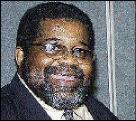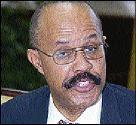Shelly-Ann Thompson, Staff Reporter 

Irons and Bailey
WITH THE global financial crisis taking a swipe at Jamaica, political leaders are facing tough decisions head-on.
Last week, Prime Minister Bruce Golding admitted that the economic meltdown would affect some of Jamaica's critical economic structures.
In allaying fears of the full impact, the prime minister has pulled together a team to monitor the situation and make recom-mendations. This calls for possibly tough decision making over very lengthy meetings which can take a toll on one's health.
Fortitude
Medical experts note that under these stressful situations, political leaders must possess mental fortitude.
Dr Aggrey Irons, clinical psychiatrist, says state leaders must anticipate change and its com-plexities. This, he says, is practising good stress management technique.
"When someone goes up for politics, he or she is volunteering for a high stress occupation. You have to strengthen yourself," warns Irons. "Anticipation means you defuse it (stress) by expecting it."
The clinical psychiatrist says these techniques, when applied, should be combined with a reliable support base through family and co-workers.
A-B-C technique
Dr Alverston Bailey, immediate past president of the Medical Association of Jamaica, says political leaders should mitigate stress by being prepared mentally and physically.
Preparation, he says, may be achieved by what he refers to as an A-B-C technique.
The first approach, A, he explains, is to "avoid the problem. If one cannot, accept responsibility, and then endeavour to alter it.
"The second phase, B, is to build resistance. By so doing, one can often defuse problems.
"Lastly, but certainly important, is C, which stands for change perception. If you do that, then what is stressful for you may become tolerable," advises Bailey.
On a lighter note, he offers: "If you should take yourself and others too seriously, you will freak out."
The medical doctor also advises against imbibing stimulants during stressful situations. Caffeine-laced energy drinks, alcohol-based items and over-the-counter drugs must be avoided, he stresses.
"These types of liquids give short-term energy boost but it burns you out after a while. Eating right is also important.
"Politicians should ensure that they have a rainbow coloured diet (balanced)," Bailey says.
Leaders caught in high-stress occupations
Stress management menu
Three sessions of rigorous exercise: if unable to do all, put in one good cardiovascular health exercise each week. One will be able to think clearer to make informed decisions.
Deep breathing is as effective as drugs. Engage while going to meetings, it helps to maintain calm.
Listen to relaxation tapes: Audio tapes of birds singing, waves splashing, nice instrumental music that one can listen to while driving.
- Alverston Bailey

